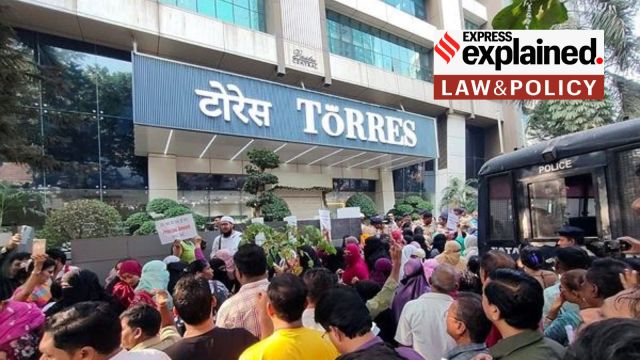Investors who were defrauded in the Torres Ponzi scam may receive about Rs 40 crore over the next six months. The Mumbai Police’s Economic Offences Wing (EOW) has begun the procedure to commence auctioning the seized properties of the accused parties, under the MPID Act.
In January, thousands of investors staged protests outside multiple Torres outlets in Mumbai after they suddenly stopped receiving their promised interest payments in various investment schemes in late December 2024. According to the EOW investigation, the company had allegedly floated multiple schemes encouraging them to buy jewellery at exorbitant weekly interest rates, with some yielding an annual return of up to 500 per cent. The company allegedly lured them with incentives such as iPhones, jewellery and other expensive gifts, including branded bags, cars, and apartments. The payments suddenly stopped in December 2024, causing panic among those who had invested with Torres.

This case is the latest to be registered under the MPID Act which concerns the attachment of seized assets from fraudulent establishments and their sale and distribution. Similar acts have been enacted in other states. Here is what to know about the act.
What is the MPID Act and why was it passed in Maharashtra?
The Maharashtra Protection of Interest of Depositors (in Financial Establishments) Act, 1999, was enacted by the state legislature, and received the President’s assent on January 21, 2000. At its introduction, the bill identified the growth of financial establishments in the state, with some intending to defraud the public by grabbing their deposited money. These investors mostly belonged to the middle class and poor economic backgrounds, and were lured with the promise of unprecedented interest rates or returns.
“As such deposits run into crores of rupees, it has resulted in great public resentment and uproar, creating law and order problems in the State of Maharashtra, especially in the city like Mumbai which is treated as the financial capital of India. It is, therefore, expedient to make a suitable legislation in the public interest to curb the unscrupulous activities of such Financial Establishments in the State of Maharashtra,” the statement introducing the bill said.
What are the main provisions of the Act?
The Act states that any financial establishment which fraudulently defaults repayment of deposit on maturity along with benefit in the form of interest, bonus, profit as assured, then every person including its promoter, partner, director, manager, employee responsible for the management or conducting business, can be held responsible. If found guilty, they can be sentenced to imprisonment for a maximum term of six years and fined up to Rs 1 lakh.
Story continues below this ad
The Act also empowers the government to issue an order attaching the money or other property believed to have been acquired by the financial establishment. It lays out the procedure to be followed with powers designated to courts to make the order of attachment absolute.
Once an order is passed, the court can issue directions for the sale of the assets and its equitable distribution of the amount among the depositors. Unlike the provisions in criminal law which deal with cheating and fraud by financial establishments, the speedy procedure for attachment and distribution of the properties makes the Act significant for depositors.
What has the Supreme Court said about the constitutional validity of the Act?
In 2005, the Bombay High Court ruled that the MPID Act was unconstitutional as its provisions were at variance with the central law under the Companies Act, 1956. The high court said that the Maharashtra Act transgressed into the field reserved for the Parliament, with the aspect of non-payment of returns by non-banking financial establishments already covered by the Companies Act and the Reserve Bank of India Act, 1934.
Story continues below this ad
In 2011, the Supreme Court decided on an appeal against the high court order as well as another order regarding a similar act in Tamil Nadu. The Supreme Court held both the MPID Act and the Tamil Nadu Act constitutionally valid. It held that the financial establishments booked under the state laws had not obtained any licence from the RBI.
The apex court held that the existing central laws do not occupy the field of these state laws. According to the SC, the state laws intended to attach and sell properties of fraudulent financial institutions to provide an effective and speedy remedy to aggrieved depositors.
“The conventional legal proceedings incurring huge expenses of court fees, advocates’ fees, apart from other inconveniences involved and the long delay in disposal of cases due to docket explosion in Courts, would not have made it possible for the depositors to recover their money, leave alone the interest thereon,” the Supreme Court had said. In 2022 too, the Supreme Court held the Act valid.
There have been issues raised before courts on what constitutes deposits or financial establishments, which have been decided based on the merits of the particular case.








































